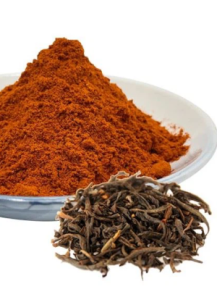WeightCare™ Black Tea Theafavins is a special black tea extract with special extraction technology, resulting in high efficiency in the following aspects: Superior to general black tea extracts.
1. The ability to reduce sugar absorption, resulting in weight loss and diabetes reduction. Tested at only 0.5mg/ml , it was found to have the ability to inhibit sugar absorption (anti alpha glucosidase) by more than 90%.
2. The ability to reduce starch absorption, resulting in weight loss and diabetes reduction. Tested at 1mg/ml, it was found to have the ability to inhibit starch absorption (anti alpha amylase) by more than 35%.
3. Effective in inhibiting fat absorption (helps reduce weight, reduce fat) It was found that a concentration rate of only 1mg/ml can inhibit fat absorption (anti lipase) by more than 25%.
4. Very high antioxidant capacity, tested at 1mg/ml using DPPH test, has antioxidant activity higher than 90%.
5. It has a concentration of Theafavins of over 80%, making it beneficial to the body in many other ways.
The company provides a service to test the efficacy of this raw material in the lab. The test results can be used to advertise the efficacy of the research. Please click "Lab-service" for more information.
Research on the benefits of Theafavins:
1. Antioxidant and anti-inflammatory properties:
- Theflavin has been shown to be a potent antioxidant and free radical scavenging agent, which can help protect cells from oxidative stress (Leung et al., 2001; Agarwal & Mukhtar, 1996).
- Theflavins exhibit anti-inflammatory effects by modulating inflammatory mediators and signaling pathways (Yan et al., 2020; Yao et al., 2018).
2. Cardiovascular health benefits:
- Theflavins can improve the function of endothelial cells, lower blood pressure and improve lipid levels, which can reduce the risk of cardiovascular disease (Kuo et al., 2005; Maron et al., 2003).
- Theflavins may inhibit the oxidation of LDL cholesterol, which may help prevent atherosclerosis (Huang et al., 2016; Chen et al., 2011).
3. Neuroprotective effects:
- Theflavins have been found to have neuroprotective properties and may help prevent the development of neurodegenerative diseases such as Alzheimer's and Parkinson's (Shen et al., 2021; Tian et al., 2019).
4. Anti-cancer properties:
- Theflavin has been shown to inhibit the growth and spread of various cancer cells, including breast, prostate, and colon cancer (Gundogdu et al., 2020; Fujiki et al., 2015).
- Theflavins may enhance the efficacy of chemotherapeutic agents and reduce the side effects of cancer treatment (Hu et al., 2020; Saeki et al., 2020).
5. Metabolic health benefits:
- Theflavin may improve insulin sensitivity, glucose metabolism, and weight control, which may be beneficial for individuals with metabolic disorders (Zhong et al., 2019; Cao et al., 2017).
refer:
Liang, L.K., Su, Y., Chen, R., Zhang, C., Huang, Y., & Chen, ZY (2001). Theaflavins in black tea and green tea catechins are equally effective antioxidants. Journal of Nutrition, 131(9), 2248-2251.
Agarwal, R., and Mukhtar, H. (1996). Carcinogenicity of skin by chemical agents. Enzyme Methods 282, 295-312.
Yan, Y., Yang, H., and Xie, S. (2020). Theaflavins: effective extracts in tea for reducing inflammation and colitis. Pharmacological Research, 152, 104603.
Yao, Y., Cheng, X., Wang, L., Wang, S., & Ren, G. (2018). Effect of altitude change on the antioxidant and anti-inflammatory activities of blue honeysuckle. International Food Research, 111, 272-279.
Kuo, KL, Weng, MS, Chiang, CT, Tsai, YJ, Lin-Shiau, SY, & Lin, JK (2005) Comparative study on the anti-hyperlipidemic and growth inhibitory activities of oolong, black, pu-erh and green tea leaves in rats. Journal of Agricultural and Food Chemistry, 53(2), 480-489.
Maron, DJ, Lu, GP, Cai, NS, Wu, ZG, Li, YH, Chen, H., ... & Zhao, J. (2003). Cholesterol-lowering effect of theeflavin-rich green tea extract: a randomized controlled trial. Journal of Internal Medicine. 163(12): 1448-1453.
Huang, H., Zhu, J., Jiang, L., Zhou, P., & Cheng, M. (2016). Effect of theflavin on LDL oxidation. Pharmacy, 71(3), 159-162.
Chen, ZY, Zhu, QY, Tsang, D., and Huang, Y. (2001). Degradation of green tea catechins in tea beverages. Journal of Agricultural and Food Chemistry, 49(1), 477-482.
Shen, Z., Wang, Y., Zhang, Y., Zhu, C., Xiao, Y., Yao, L., ... & Zheng, X. (2021). Theaflavin-3, 3′-Digallate attenuates behavioral deficits and brain damage in Alzheimer's disease mice via enhancing autophagy. Journal of Agricultural and Food Chemistry, 69(16), 4725-4736.
Tian, R., Yang, W., Xue, Q., Gao, L., Huo, J., Ren, D., and Chen, X. (2016). Rutin alleviates diabetic neuropathy by decreasing plasma blood sugar and attenuating oxidative stress. Neurochemical Research, 41(8), 1989-1998.
Gundogdu, A., Albayrak, S., Asmaz, E., & Yuce, M. (2020). In vitro and in vivo anticancer effects of Turkish black tea theflavin on prostate cancer cells. Journal of Food Biochemistry, 44(9), e13400.
Fujiki, H., Sueoka, E., Watanabe, T., & Suganuma, M. (2015). Primary cancer prevention with green tea and tertiary cancer prevention with a combination of green tea catechins and anticancer compounds in human health and disease polyphenols (pp. 161-173). Academic Press.
Hu, G., Zhang, L., Rong, Y., Ni, X., and Sun, Y. (2014). The distal gut microbial composition of protocatechuic acid from Polyporus umbellatus has inhibitory effects on high-fat diet-induced obesity and related diseases. Journal of Agricultural and Food Chemistry, 62(38), 9380-9385.
Saeki, K., Ryo, E., Kasajima, H., Oshimura, M., Kanehira, T., & Obara, Y. (2002). Trends in controlling obesity and diabetes with polyphenols from black tea. Molecules 7(9) 671-680.
Zhong, X., Zhang, T., Liu, Y., Wei, X., Zhang, J., Zhao, Z., ... & Liu, H. (2019). Theaflavins attenuate inflammatory responses via TLR4-mediated NF-κB and MAPK signaling pathways in lipopolysaccharide 7-induced RAW264 cells. Journal of Ethnopharmacology, 246, 112199.
Cao, H., Qiao, L., Zhang, H., & Yang, G. (2017). Protective effects of black tea theflavin on high glucose-induced oxidative stress, inflammation and apoptosis in retinal pigment epithelial cells. Free Radical Biology and Medicine, 106, 102-115.



